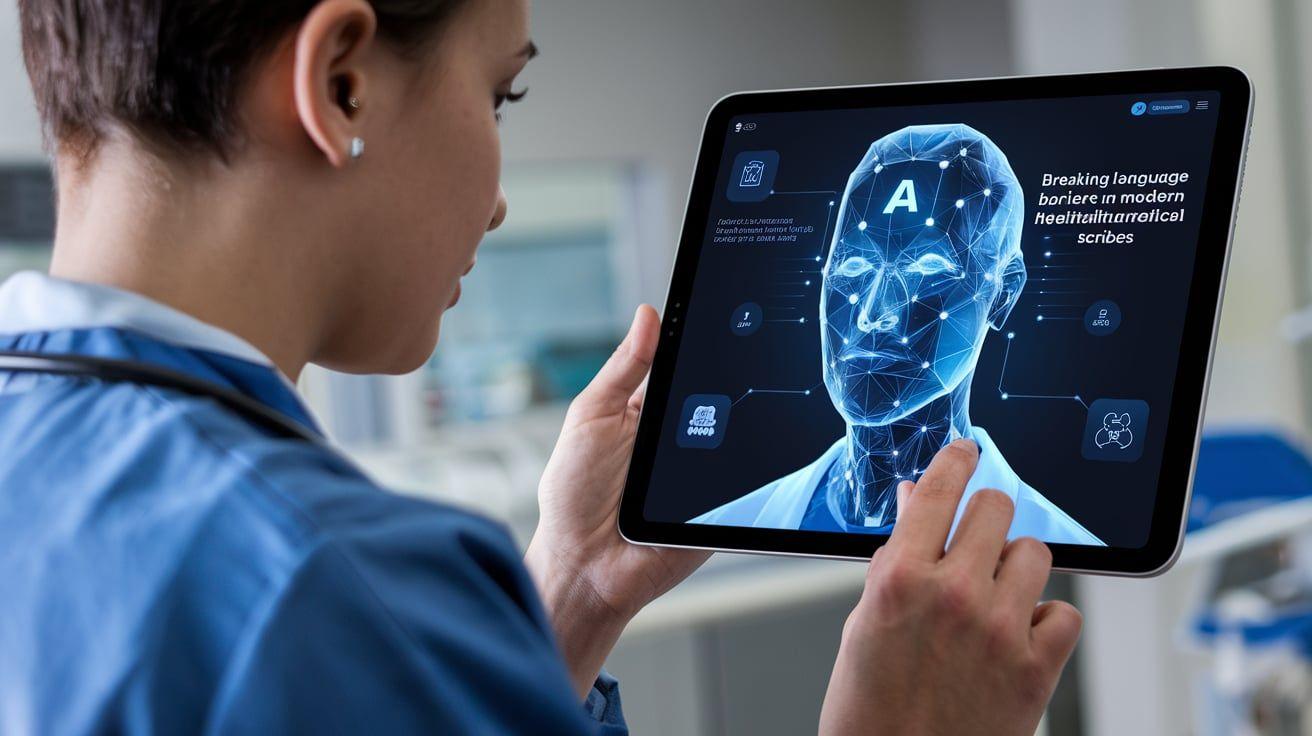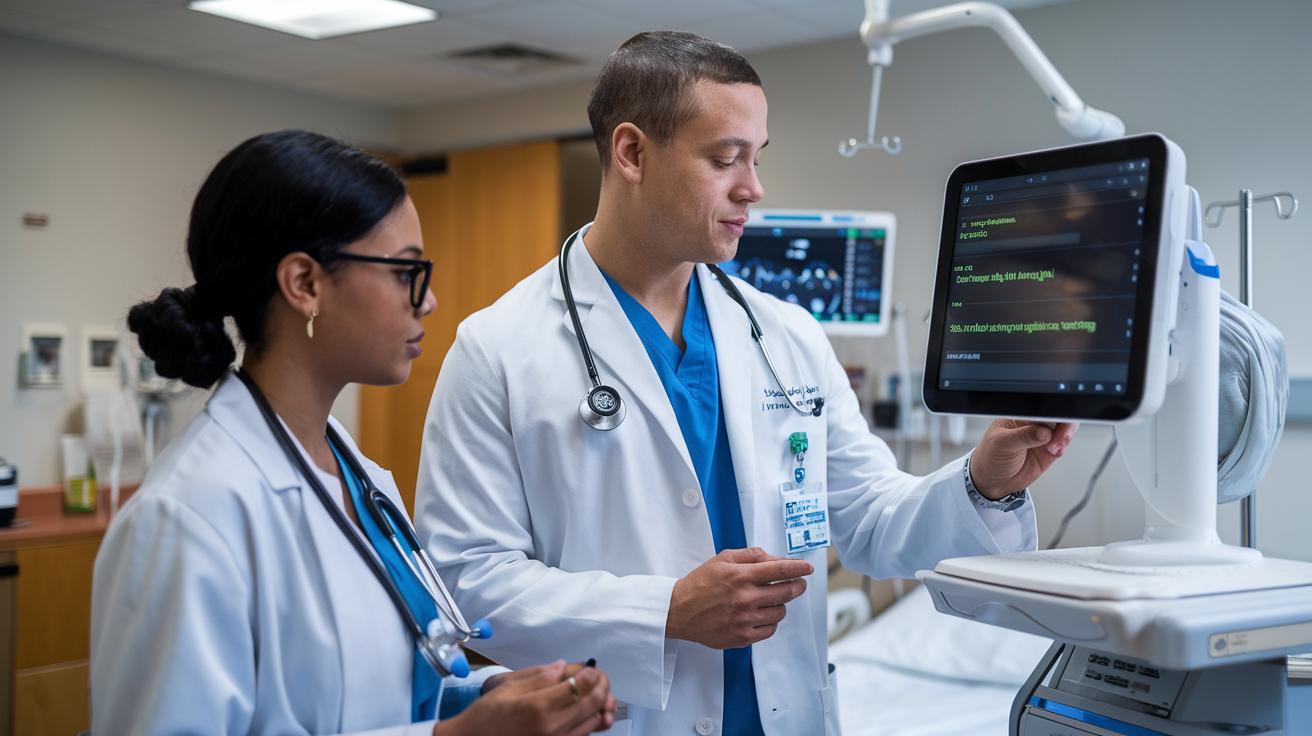Enhancing Multilingual Patient Visits With AI Clinical Scribes
Ai Clinical Scribe
April 16, 2025

Healthcare communication is more important than ever in today's increasingly diverse society. Language differences between clinicians and patients can cause misunderstandings, misdiagnoses, and inefficient therapies. AI Clinical Scribes is poised to change healthcare multilingual communication by bridging language divides and guaranteeing that no patient is ignored.
Modern technology is rapidly enhancing multilingual patient visits with AI virtual assistants, multilingual chatbots, and real-time translation. But is there anything more we can do?
What if AI were able to fully record visits made in languages other than English, along with translating them? What characteristics do you believe are most important for multilingual AI in healthcare as this technology develops? Let's see how breaking language barriers in modern healthcare with AI is important.
The Growing Need for Multilingual Support in U.S. Healthcare
Healthcare professionals in the United States are likely to come across a patient population that speaks many languages. Because one in five Americans speaks a language other than English at home.
The community benefits from this diversity, but it can also present serious obstacles to the efficient supply of healthcare. Language problems cause miscommunication that results in misdiagnosis, ineffective treatments, dissatisfied patients, and general delays in the provision of healthcare.
Medical professionals are required to provide translation services to people with limited English proficiency (LEP) under US federal law. The "Language Access Plan" was introduced by the U.S. Department of Health and Human Services (HHS) in 2023, enhancing multilingual patient visits with Al for meaningful access to care.
Healthcare systems can promote culturally sustainable care, increase health literacy and equity, and improve service accessibility by tackling these linguistic challenges. Medical translation services are required by law, but they tend to be underutilized.
They are expensive, with interpreters charging up to. Recent developments in artificial intelligence (AI) give affordable answers to some of the problems that medical professionals encounter when interacting with patients who speak different languages.
How to Overcome the Communication Barrier with the Use of AI?

Some of the difficulties that healthcare providers face while interacting with multilingual patients can be affordably overcome by recent developments in artificial intelligence (AI):
Tools for Real-Time Translation
AI-powered translation services such as Google Translate and Microsoft Translator have achieved significant advancements in accuracy and fluency. These services can be used in healthcare environments to offer immediate time translations.
Thus improving communication between patients and medical staff. This language translation by AI guarantees that important data is properly communicated.
Virtual Assistants and Chatbots with Multiple Languages
Artificial intelligence chatbots and virtual assistants can communicate with patients in their native tongues. Virtual medical interpreters respond to common inquiries, set up appointments, and give information on illnesses and therapies.
These resources can be made available all the time, providing help outside of typical clinic hours and lessening the workload for medical personnel.
Electronic Health Record (EHR) Integration
Healthcare providers may guarantee that patient data is correctly recorded in many languages through the combination of AI translation services with Electronic Health Records (EHR). This integration lets patients use the portal in their chosen language and gives clinicians access to full patient histories in any language spoken during the session. Furthermore, it guarantees improved communication between medical professionals.
BestAl Tool To Overcome The Communication Barrier
What if I tell you Al Clinical Scribe is providing free trials in 9 different languages to test its efficacy? Yes, whether you are a doctor, a nurse, or any other healthcare professional, this software is designed to take notes of the discussion held during a patient’s visit, organize each and every detail as required, and even improve the written information to help you provide better medical support.
Now you don't have to waste hours in taking a patient's medical history and you can easily keep their record by enhancing multilingual patient visits with AI. But wait! There is more.
Explore the market of AI-powered medical scribes and you will understand how expensive most of the providers are. But with Al Clinical Scribe, budget is not a problem anymore. You can get a whole month subscription in just $19.99 which is not a huge sum if compared to the perks offered by this amazing Al patient care service.
As far as security is concerned, there is no need to worry about the safety of your data as this EHR integration software is HIPAA-complaint and ensures that your records are not stored at the back end. This transparency makes it worth-using.
Our cutting-edge technology ensures that patient records are accurate, comprehensive, and up to date, enhancing both the quality of care and operational efficiency. So, give Al Clinical Scribe a try and you will love using it.
Explore the Benefits of Multilingual Patient management
There are various benefits to using AI for multilingual patient care.
Improved Results for Patients
AI that communicates aids doctors in properly diagnosing patients and developing effective treatments that improve patient outcomes.
Increased Satisfaction with Patients
Patients feel more at ease and self-assured when they can communicate in their own tongue. This boosts their contentment and trust in the medical system.
More Simplified Procedures
AI frees up healthcare professionals to concentrate more on providing treatment rather than resolving communication issues. Furthermore, it streamlines administrative duties, cutting down on patient wait times.
Financial Savings
AI can lower the number of incorrect diagnoses and needless rechecks. Because of this they will save money for patients and healthcare professionals alike. The use of automation also provides a more affordable option than standard translation techniques by enhancing multilingual patient visits with AI.
Challenges and Things to Think About
Given that AI has a lot of potential there are still challenges to overcome before it can be used in multilingual patient care:
Precision and Trustworthiness
AI medical translators have advanced, yet they still have flaws. It is important to guarantee the precision and dependability of translations, in particular when dealing with intricate medical data for enhancing multilingual patient visits with Al.
Security and Privacy
Strong security measures are necessary while handling sensitive patient data for the purpose of preserving data privacy. Healthcare providers need to make sure AI tools agree to laws like HIPAA.
Sensitivity to Culture
Language is only a component of effective communication; another is being aware of cultural quirks. AI tools must be culturally responsive to provide truly effective treatment.
Language Access Laws: What Providers Must Know
Healthcare professionals are required by federal law to provide LEP patients with language help. However, hiring interpreters can be expensive. Personal services may run anything from $25 to $150 per hour. AI Clinical Scribes provides real-time medical interpretation with AI, compliance-ready translation without the high cost, keeping providers inside the law while cutting costs.
AI Clinical Scribes: A Game-Changer for Multilingual Healthcare
The terms "real- transcription and multilingual healthcare support of patient visits are provided by our AI Clinical scribe system. Our software listens, interprets, and generates precise clinical notes in English for your EHR no translator is required whether a conversation takes place in Arabic, Mandarin, or Spanish.
AI Clinical scribes can give services in 19 languages at very low cost. That is why we called AI clinical scribes a game changer for multilingual healthcare.
The Final Thoughts: Multilingual Healthcare's Future
The future of healthcare is one in which everyone, no matter their language, will get high-quality care and language barriers are decreased. AI Clinical Scribes can increase healthcare equity by allowing clear communication between the patient and the physician without the interruptions of interpreters or language obstacles.
Now you better understand why breaking language barriers in modern healthcare with AI is important. By enhancing multilingual patient visits with AI, Clinicians can ensure that every patient receives the care they need in the language they are most comfortable with, with AI-powered voice recognition and EHR integration.

